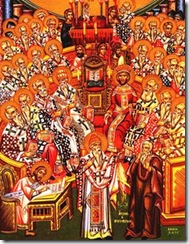Grace@Work eCOMMENTARY: Should Christians Convert Others?
It was quite jarring to walk into bookstores in Malaysia to be confronted with the cover of the June, 30th issue of TIME magazine.
The headline screamed: "Should Christians Convert Muslims?"
Fact is, there are state laws in Malaysia that penalizes anyone caught "enticing" a Muslim to leave his or her faith. Therefore the issue of how Christians should reach the Muslim community for Christ is one that is hardly discussed in public in Malaysia.
My first response to the headline was "I would frame the question differently."
The Scriptures teach quite clearly that conversion is the work of the Holy Spirit i.e. God's own Spirit (John 16:8-11). A Christian may share the truths of
the gospel, she may appeal to people to embrace the truth of the gospel, but he cannot convert anyone.

Indeed the church of Christ has often gotten into trouble when she crosses the boundary and tries to do the work of the Holy Spirit, "helping" people to
convert through the use of military or governmental powers, or enticing people to Christ through the giving of aid in times of need.
(I quickly need to qualify that Christians are called to show compassion to all in need, giving with a free hand, giving unconditionally. This indirectly reveals
the heart of Christ. But we cannot ever imply that to receive help, one must first embrace Christianity.)
No, we cannot convert anyone. Nevertheless, there are certain truths in the Scriptures that are clear. Two of them are:
1. Jesus is the only solution to the root problem of humankind - sin.
"There is salvation in no one else, for there is no other name under heaven given among mortals by which we must be saved." Acts 4:12 NRSV
2. Followers of Jesus are called to bring this message to all races and communities.
"Go therefore and make disciples of all nations baptizing them in the name of the Father and of the Son and of the Holy Spirit, and teaching them to obey
everything that I have commanded you. And remember, I am with you always, to the end of the age." Matthew 28:19-20
The irony is that Islam and Christianity share a number of things in common. One of them is a common adherence to the concept of objective and absolute truth. Standing against the post modern mood of many truths for many people, Islam and Christianity would say that if Islam or Christianity were true, then other answers to the fundamental questions of humankind --- "where did we come from", "why are we
what we are", "what is the ultimate solution for humankind's problems"---are wrong.
The temptation for Christians and Muslims alike, is to jettison our commitment to absolute truth. We are told to "play nice" and live and let live. Any position
that takes truth as absolute will lead to fanaticism and violence. After all, the modern world is a pluralistic world of many faiths. Let every faith community do their own thing but don't try to "convert" others.
This position is appealing because there many conflicts around the world that appear to be rooted in religious differences.
Unfortunately any backing away from a commitment to absolute truth undercuts the very basis of the truth of the Christian gospel. If Christianity is not true for all it is not true at all. Why should God come as man and to die on the cross if there was any other way? I am always amused when I hear people say that all religions are essentially the same. Such people betray the fact that they have not studied religions with any degree of depth.
Of course no one wants intercommunal violence. What this means for Christians is that we must take a long hard look at how we share the gospel. I am particularly partial to Leslie Newbigin's suggestion that the lives of Christians must be so different that we arouse the curiosity of those outside the faith.
(See for example his "The Gospel In A Pluralist Society.") And when they ask why we are different, then we answer with the gospel.
For example, I recall the enemies of Christ having to acknowledge "how they love one another" when they looked at the early Christian communities. I wonder if
they would say the same today.
The whole question of Christian-Muslim relationships is a big and complex one. I speak to those within the Christian community. We follow a crucified Christ and
have been specifically warned that his followers would suffer the same fate (2 Timothy 3:12). Suffering is intertwined deep in the Christian DNA. We must never
kill for Christ (Matthew 26:47-56). But we must always be ready to suffer and die for Him.
Before we even think of such heroic possibilities, we must first ask: What is the quality of our life in Christ? Do Christians and churches reflect so jarringly the love and holiness of God that people pause to look and ask questions? Or are we
qualitatively no different from those who do not follow Christ?
If there is no real difference, then there really is nothing for people to "convert" to is there?
Your brother,
Soo-Inn Tan
July 25th 2003.
Photo courtesy of
FUBCNO
 Abba Ah Beng bought a kitten to catch the rats that were eating his loincloth. The kitten was very cute but playful. During chapel service, she would sneak quietly into the chapel and distract the young disciples of Sow Lin Monastery from their prayers and meditation. A sudden touch of warm fur and a perfect purr was enough to draw the most devout from the depths of God.
Abba Ah Beng bought a kitten to catch the rats that were eating his loincloth. The kitten was very cute but playful. During chapel service, she would sneak quietly into the chapel and distract the young disciples of Sow Lin Monastery from their prayers and meditation. A sudden touch of warm fur and a perfect purr was enough to draw the most devout from the depths of God.

















